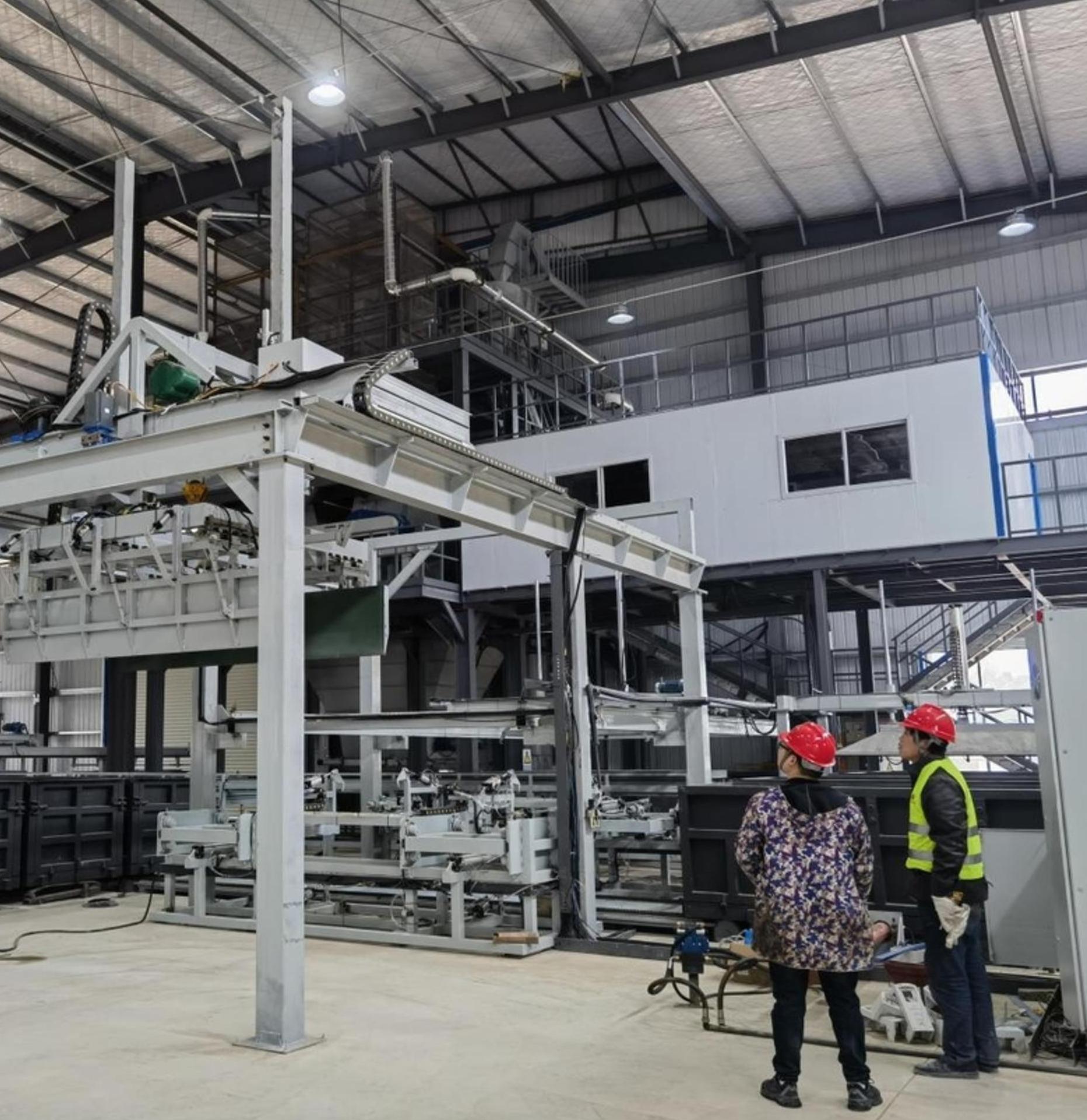The code of delicious Ningxiang swine
The pork of Ningxiang swine is plump and delicious. At 5 pm on April 11, 20 Ningxiang pigs were sold out in less than a day at a small meat shop in Sifangping, Changsha City, and many customers returned empty-handed.
Zeng Qinghua, the “Doctor Swineherd” who runs Hunan ChuWeiXiang Agriculture and Animal Husbandry Co., Ltd, has put in a lot of research and gained valuable insights.

Sleeping in the pigsty to remodel pig pen
Zeng Qinghua has a PhD in animal genetics and breeding engineering from Hunan Agricultural University, so he has considerable expertise in raising pigs. He even sleeps in the pigsty to figure out the pig’s habits.
He often smelled a special foul smell. Upon closer inspection, it was found that the pigs were relatively short in size, and the hydrogen sulfide in their fart settled near the ground, making it difficult to dissipate. Hydrogen sulfide will make pigs highly susceptible to disease, and sometimes when pigs get sick but the cause cannot be found, it may come from this source. After he installed a fresh air system in the pigsty, the problem was solved accordingly.
Zeng observed that Ningxiang pigs have short mouths but the feed pipes purchased on the market are long. It is difficult for the pigs to bite the pipes, so they did not like to drink. Insufficient water intake is not conducive to the health of pigs. So he switched to using a water basin to feed water, and the pigs drank happily.
In the past, the pigs always liked to dig their food out of the feeding bowl with the snouts when they were fed. After observing this situation for a few days, he found that it was because the feeding corner was dim, and the pigs dug the bowl with their snouts to confirm its position. Therefore, he replaced the feeding bowl with a transparent one or cut a hole in the bowl to let light in, which solved the problem to a large extent.
After these renovations, the Ningxiang pigs raised by Zeng Qinghua live in the five-star pig pen and the pigs’ lives has never been better.
A secret recipe feed to reduce costs
After years of accumulation, Zeng discovered that the habits of Ningxiang pigs are very different from those of ordinary white pigs. Raising Ningxiang pigs requires efforts in four aspects, that is pig breeds, pig pens, pig feed, and vaccines.
It’s not easy to delve deeply into these four points. Fortunately, Zeng Qinghua is not the only one sticking to pig raising. Yin Yulong, an academician of the CAE Member, is interested in Ningxiang pigs. To become his student, one must first learn to raise pigs. More than 40 doctoral students and over a hundred masters have studied Ningxiang pigs under Yin’s guidance.
Meanwhile, Yin’s team customized a secret recipe feed for the pigs. With the traditional feed, the pigs would only gain 2 kilograms of gross weight by eating 9 kilograms, but now they can gain 2 kilograms by eating 7 kilograms of the secret recipe feed. The soybean meal and corn in the feed have been replaced with cheaper non-grain forage, which saved 300 yuan in board expenses for raising a pig.
Recently, Zeng Qinghua found that the natural antibiotics rich in mulberry leaves can improve the intestinal environment of the pigs after fermentation. After a series of experiments, he replaced the leaves in the feed with mulberry leaves, which greatly improved the disease resistance of the pig and made its meat fresher and tenderer.
Genome editing to cultivate better breeds
With the help of the Yin’ team, Zeng discovered that the Ningxiang pig has dozens of gene sequences that are different from those of ordinary white pigs. In the field of science, the flavor of Ningxiang pigs is converted into precise indicators such as tenderness, fat, volatile amino acids, and muscle fiber size. Through genome editing, the key is tested one by one. After knocking out the designated gene segment, if a certain index changes significantly, you can find out the delicious function behind the gene segment.
After selecting experimental samples, the experimental team cloned 15 Ningxiang pigs with identical genes at a cost of 300,000 yuan each. With the advancement of these cloned pig genome editing experiments, groups of data are released, and the tasty code can be found naturally.
Once the key genes for good taste are found, breeding pigs with high-quality genes can be selected for breeding, and genes can be combined to cultivate better breeds.
Nowadays, Zeng Qinghua is the first in China to use whole genome breeding technology to protect and breed Ningxiang pigs. Over time, cheaper and tastier Ningxiang pigs will be served on people’s dining tables.
Zeng Qinghua, the “Doctor Swineherd” who runs Hunan ChuWeiXiang Agriculture and Animal Husbandry Co., Ltd, has put in a lot of research and gained valuable insights.

Sleeping in the pigsty to remodel pig pen
Zeng Qinghua has a PhD in animal genetics and breeding engineering from Hunan Agricultural University, so he has considerable expertise in raising pigs. He even sleeps in the pigsty to figure out the pig’s habits.
He often smelled a special foul smell. Upon closer inspection, it was found that the pigs were relatively short in size, and the hydrogen sulfide in their fart settled near the ground, making it difficult to dissipate. Hydrogen sulfide will make pigs highly susceptible to disease, and sometimes when pigs get sick but the cause cannot be found, it may come from this source. After he installed a fresh air system in the pigsty, the problem was solved accordingly.
Zeng observed that Ningxiang pigs have short mouths but the feed pipes purchased on the market are long. It is difficult for the pigs to bite the pipes, so they did not like to drink. Insufficient water intake is not conducive to the health of pigs. So he switched to using a water basin to feed water, and the pigs drank happily.
In the past, the pigs always liked to dig their food out of the feeding bowl with the snouts when they were fed. After observing this situation for a few days, he found that it was because the feeding corner was dim, and the pigs dug the bowl with their snouts to confirm its position. Therefore, he replaced the feeding bowl with a transparent one or cut a hole in the bowl to let light in, which solved the problem to a large extent.
After these renovations, the Ningxiang pigs raised by Zeng Qinghua live in the five-star pig pen and the pigs’ lives has never been better.
A secret recipe feed to reduce costs
After years of accumulation, Zeng discovered that the habits of Ningxiang pigs are very different from those of ordinary white pigs. Raising Ningxiang pigs requires efforts in four aspects, that is pig breeds, pig pens, pig feed, and vaccines.
It’s not easy to delve deeply into these four points. Fortunately, Zeng Qinghua is not the only one sticking to pig raising. Yin Yulong, an academician of the CAE Member, is interested in Ningxiang pigs. To become his student, one must first learn to raise pigs. More than 40 doctoral students and over a hundred masters have studied Ningxiang pigs under Yin’s guidance.
Meanwhile, Yin’s team customized a secret recipe feed for the pigs. With the traditional feed, the pigs would only gain 2 kilograms of gross weight by eating 9 kilograms, but now they can gain 2 kilograms by eating 7 kilograms of the secret recipe feed. The soybean meal and corn in the feed have been replaced with cheaper non-grain forage, which saved 300 yuan in board expenses for raising a pig.
Recently, Zeng Qinghua found that the natural antibiotics rich in mulberry leaves can improve the intestinal environment of the pigs after fermentation. After a series of experiments, he replaced the leaves in the feed with mulberry leaves, which greatly improved the disease resistance of the pig and made its meat fresher and tenderer.
Genome editing to cultivate better breeds
With the help of the Yin’ team, Zeng discovered that the Ningxiang pig has dozens of gene sequences that are different from those of ordinary white pigs. In the field of science, the flavor of Ningxiang pigs is converted into precise indicators such as tenderness, fat, volatile amino acids, and muscle fiber size. Through genome editing, the key is tested one by one. After knocking out the designated gene segment, if a certain index changes significantly, you can find out the delicious function behind the gene segment.
After selecting experimental samples, the experimental team cloned 15 Ningxiang pigs with identical genes at a cost of 300,000 yuan each. With the advancement of these cloned pig genome editing experiments, groups of data are released, and the tasty code can be found naturally.
Once the key genes for good taste are found, breeding pigs with high-quality genes can be selected for breeding, and genes can be combined to cultivate better breeds.
Nowadays, Zeng Qinghua is the first in China to use whole genome breeding technology to protect and breed Ningxiang pigs. Over time, cheaper and tastier Ningxiang pigs will be served on people’s dining tables.

 Ningxiang listed on China’s top 100 counties with comprehensive competitiveness
Ningxiang listed on China’s top 100 counties with comprehensive competitiveness  College welcomes a student of courage
College welcomes a student of courage  Changsha Blue Moon Valley Intelligent Home Appliances Industrial Town
Changsha Blue Moon Valley Intelligent Home Appliances Industrial Town  This is Ningxiang High-tech Zone
This is Ningxiang High-tech Zone 




